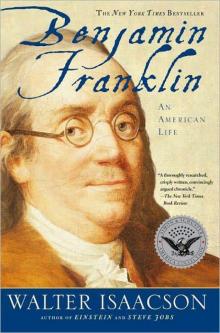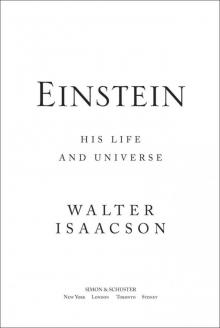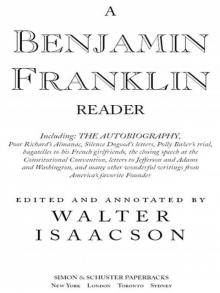- Home
- Walter Isaacson
Benjamin Franklin: An American Life Page 2
Benjamin Franklin: An American Life Read online
Page 2
By the time Josiah arrived in Banbury, the town was torn by the struggle over Puritanism. (During one of the more physical battles, a mob of Puritans toppled Banbury’s famous cross.) The Franklin family was divided as well, though less bitterly. John and Thomas III remained loyal to the Anglican Church; their younger brothers, Josiah and Benjamin (sometimes called Benjamin the Elder to distinguish him from his famous nephew), became dissenters. But Josiah was never fanatic in pursuing theological disputes. There is no record of any family feud over the issue.5
Errand Into the Wilderness
Franklin would later claim that it was a desire “to enjoy the exercise of their religion with freedom” that led his father, Josiah, to emigrate to America. To some extent, this was true. The end of Cromwell’s Puritan rule and the restoration of the monarchy in 1660 had led to restrictions on the Puritan faithful, and dissenting ministers were forced from their pulpits.
But Josiah’s brother, Benjamin the Elder, was probably right in attributing the move more to economic than religious factors. Josiah was not zealous about his faith. He was close to his father and older brother John, both of whom remained Anglican. “All evidence suggests that it was a spirit of independence, coupled with a kind of intellectual liveliness and earthy practicality, rather than controlling doctrinal persuasions, that led the only two Franklins, Benjamin the Elder and Josiah, who became Puritans, to follow that course,” wrote Arthur Tourtellot, author of a comprehensive book about the first seventeen years of Franklin’s life.6
Josiah’s greater concern was supporting his family. At age 19, he married a friend from Ecton, Anne Child, and brought her to Banbury. In quick succession, they had three children. With his apprenticeship over, he worked on salary in his brother’s shop. But there was not enough business to support both fast-growing Franklin families, and the law made it impossible for Josiah to go into a new trade without serving another apprenticeship. As Benjamin the Elder put it, “Things not succeeding there according to his mind, with the leave of his friends and father he went to New England in the year 1683.”
The story of the Franklin family migration, like the story of Benjamin Franklin, gives a glimpse into the formation of the American character. Among the great romantic myths about America is that, as schoolbooks emphasize, the primary motive of its settlers was freedom, particularly religious freedom.
Like most romantic American myths, it contains a lot of truth. For many in the seventeenth-century wave of Puritan migration to Massachusetts, as in the subsequent migratory waves that made America, the journey was primarily a religious pilgrimage, one that involved fleeing persecution and pursuing freedom. And like most romantic American myths, it also glosses over some significant realities. For many other Puritan migrants, as for many in subsequent waves, the journey was primarily an economic quest.
But to set up such a sharp dichotomy is to misunderstand the Puritans—and America. For most Puritans, ranging from rich John Winthrop to poor Josiah Franklin, their errand into the wilderness was propelled by considerations of both faith and finance. The Massachusetts Bay Colony was, after all, established by investors such as Winthrop to be a chartered commercial enterprise as well as to create a heavenly “city upon a hill.” These Puritans would not have made an either/or distinction between spiritual and secular motives. For among the useful notions that they bequeathed to America was a Protestant ethic that taught that religious freedom and economic freedom were linked, that enterprise was a virtue, and that financial success need not preclude spiritual salvation.7
Instead, the puritans were contemptuous of the old Roman Church’s monastic belief that holiness required withdrawal from worldly economic concerns, and they preached that being industrious was a heavenly as well as earthly imperative. What the literary historian Perry Miller calls “the paradox of Puritan materialism and immateriality” was not paradoxical to the Puritans. Making money was a way to glorify God. As Cotton Mather put it in his famous sermon “A Christian at His Calling,” delivered five years before Franklin was born, it was important to attend to “some settled business, wherein a Christian should spend most of his time so that he may glorify God by doing good for others, and getting of good for himself.” The Lord, quite conveniently, smiled on those who were diligent in their earthly calling and, as Poor Richard’s almanac would later note, “helped those who helped themselves.”8
And thus the Puritan migration established the foundation for some characteristics of Benjamin Franklin, and of America itself: a belief that spiritual salvation and secular success need not be at odds, that industriousness is next to godliness, and that free thought and free enterprise are integrally related.
A Man of Solid Judgment
Josiah Franklin was 25 years old when, in August 1683, he set sail for America with his wife, two toddlers, and a baby girl only a few months old. The voyage, in a squat frigate crammed with a hundred passengers, took more than nine weeks, and it cost the family close to £15, which was about six months’ earnings for a tradesman such as Josiah. It was, however, a sensible investment. Wages in the New World were two to three times higher, and the cost of living was lower.9
The demand for brightly dyed fabrics and silks was not great in a frontier town, especially a Puritan one such as Boston. Indeed, it was a legal offense to wear clothing that was considered too elaborate. But unlike in England, there was no law requiring a person to serve a long apprenticeship before going into a trade. So Josiah chose a new one that had far less glamour but far more utility: that of a tallow chandler, rendering animal fat into candles and soap.
It was a shrewd choice. Candles and soap were just evolving from luxuries into staples. The odiferous task of making lye from ashes and simmering it for hours with fat was one that even the heartiest of frontier housewives were willing to pay someone else to do. Cattle, once a rarity, were being slaughtered more often, making mass manufacture of tallow possible. Yet the trade was uncrowded. One register of professions in Boston just before Josiah arrived lists twelve cobblers, eleven tailors, three brewers, but only one tallow chandler.
He set up shop and residence in a rented two-and-a-half-story clapboard house, only thirty feet by twenty, on the corner of Milk Street and High Street (now Washington Street). The ground floor was only one room, with a kitchen in a separate tiny structure added in the back. Like other Boston houses, it had small windows so that it would be easier to keep warm, but it was brightly painted to make it seem more cheerful.10
Across the street was the South Church, newest and most liberal (relatively speaking) of Boston’s three Puritan congregations. Josiah was admitted to membership, or permitted to “own the covenant,” two years after his arrival.
Church membership was, for the Puritans at least, a social leveler. Although he was merely a struggling tradesman, Josiah was able, because of his membership in the South Church, to become friends with such colony luminaries as Simon Bradstreet, the onetime governor, and Judge Samuel Sewall, a Harvard fellow and diligent diarist.
A trusted and paternalistic figure, Josiah rose within Boston’s Puritan/civic hierarchy. In 1697, he was tapped to become a tithing-man, the name for the moral marshals whose job it was to enforce attendance and attention at Sunday services and to keep an eye out for “nightwalkers, tipplers, Sabbath breakers…or whatever else tending toward debauchery, irreligion, profaneness and atheism.” Six years later, he was made a constable, one of eleven people who helped oversee the tithingmen. Although the posts were unpaid, Josiah practiced the art, which his son would perfect, of marrying public virtue with private profit: he made money by selling candles to the night watchmen he oversaw.11
In his autobiography, Benjamin Franklin gives a lapidary description of his father:
He had an excellent constitution of body, was of middle stature, but well set and very strong. He was ingenious, could draw prettily, was skilled a little in music and had a clear pleasing voice, so that when he played Psalm tunes on his violin and sung wit
hal as he sometimes did in an evening after the business of the day was over, it was extremely agreeable to hear. He had a mechanical genius too, and on occasion was very handy in the use of other tradesmen’s tools. But his great excellence lay in a sound understanding, and solid judgment in prudential matters, both in private and public affairs…I remember well his being frequently visited by leading people, who consulted him for his opinion in affairs of the town or of the church…He was also much consulted by private persons about their affairs when any difficulty occurred, and frequently chosen an arbitrator between contending parties.12
This description was perhaps overly generous. It is contained, after all, in an autobiography designed in part to instill filial respect in Benjamin’s own son. As we shall see, Josiah, wise though he undoubtedly was, had limited horizons. He tended to dampen his son’s educational, professional, and even poetic aspirations.
Josiah’s most prominent trait was captured in a phrase, deeply Puritan in its fealty to both industriousness and egalitarianism, that would be inscribed on his tombstone by his son: “Diligence in thy calling.” It came from Josiah’s favorite piece of Solomonic wisdom (Proverbs 22:29), a passage that he would quote often to his son: “Seest thou a man diligent in his calling, he shall stand before Kings.” As Franklin would recall when he was 78, with the wry mixture of light vanity and amused self-awareness that pervades his autobiography, “I from thence considered industry as a means of obtaining wealth and distinction, which encouraged me, though I did not think that I should ever literally stand before kings, which, however, has since happened; for I have stood before five, and even had the honor of sitting down with one, the King of Denmark, to dinner.”13
As Josiah prospered, his family grew; he would have seventeen children over a period of thirty-four years. Such fecundity was common among the robust and lusty Puritans: the Rev. Samuel Willard, pastor of the South Church, had twenty children; the famous theologian Cotton Mather had fifteen. Children tended to be a resource rather than a burden. They helped around the house and shop by handling most of the menial chores.14
To the three children who accompanied them from England, Josiah and Anne Franklin quickly added two more, both of whom lived to adulthood: Josiah Jr., born in 1685, and Anne Jr., born in1687. Then, however, death struck brutally. Three times over the next eighteen months, Josiah made the procession across Milk Street to the South Church burial grounds: first in 1688 for a newborn son who died after five days; then in 1689 for his wife, Anne, who died a week after delivering another son; then for that son who died after another week. (One-quarter of all Boston newborns at the time died within a week.)
It was not unusual for men in colonial New England to outlive two or three wives. Of the first eighteen women who came to Massachusetts in 1628, for example, fourteen died within a year. Nor was it considered callous for a bereaved husband to remarry quickly. In fact, as in the case of Josiah, it was often considered an economic necessity. At the age of 31, he had five children to raise, a trade to tend, and a shop to keep. He needed a robust new wife, and he needed her quickly.
A Virtuous Woman
Like the Franklins, the Folger (originally Foulgier) family was rebellious but also practical, and they shared the same mix of religious and economic restlessness. Descended from reformist Flemish Protestants who had fled to England in the sixteenth century, the Folgers were among the first wave of emigrants to depart for Massachusetts when Charles I and his Archbishop of Canterbury, William Laud, began cracking down on the Puritans. The family of John Folger, including his 18-year-old son Peter, sailed for Boston in 1635, when the town was a mere five years old.
On the voyage over, Peter met a young servant girl named Mary Morrill, who was indentured to one of the Puritan ministers aboard. After their arrival, Peter was able to buy her freedom for £20 and take her as his wife.
Having found religious and personal freedom, the Folgers were restless for economic opportunities. From Boston they moved to a new settlement up the river called Dedham, then to Watertown, and finally to Nantucket Island, where Peter became the schoolmaster. Most of the inhabitants were Indians, and he learned their language, taught them English, and attempted (with great success) to convert them to Christianity. Rebellious in nature, he underwent his own conversion and became a Baptist, which meant that the faithful Indians whom he had led to Christianity now had to follow him through a ritual that required total immersion.
Displaying the robust resistance to authority that ran in both the Folger and Franklin families, Peter was the sort of rebel destined to transform colonial America. As clerk of the court on Nantucket, he was at one point jailed for disobeying the local magistrate during a struggle between the island’s wealthy shareholders and its growing middle class of shopkeepers and artisans.15
He also wrote a near-seditious pamphlet, in verse, sympathizing with the Indians during what became known as King Philip’s War in1676. The war, he declared, was the result of God’s anger at the intolerance of the Puritan ministers in Boston. His passion overpowered his poetic talents: “Let Magistrates and Ministers /consider what they do; / Let them repeal those evil laws, / and break those bonds in two.” Later, his grandson Benjamin Franklin would pronounce that the poem was “written with manly freedom and a pleasing simplicity.”16
Peter and Mary Folger had ten children, the youngest of whom, Abiah, was born in 1667. When she was 21 and still unmarried, she moved to Boston to live with an older sister and her husband, who were members of the South Church. Although raised as a Baptist, Abiah joined the congregation shortly after her arrival. By July 1689, when the well-respected tallow chandler Josiah Franklin went there to bury his wife, Abiah was a faithful parishioner.17
Less than five months later, on November 25, 1689, they were married. Both were the youngest children in a large brood. Together they would live to unusually ripe ages—he to 87, she to 84. And their longevity was among the many traits they would bequeath to their famous youngest son, who himself would live to be 84. “He was a pious and prudent man, she a discreet and virtuous woman,” Benjamin would later inscribe on their tombstone.
Over the next twelve years, Josiah and Abiah Franklin had six children: John (born 1690), Peter (1692), Mary (1694), James (1697), Sarah (1699), and Ebenezer (1701). Along with those from Josiah’s first marriage, that made eleven children, all still unmarried, crammed into the tiny Milk Street house that also contained the tallow, soap, and candle equipment.
It might seem impossible to keep a watchful eye on so large a brood in such circumstances, and the Franklin tale provides tragic evidence that this was so. When he was a toddler of 16 months, Ebenezer drowned in a tub of his father’s suds. Later that year, in 1703, the Franklins had another son, but he also died as a child.
So even though their next son, Benjamin, would spend his youth in a house with ten older siblings, the youngest of them would be seven years his senior. And he would have two younger sisters, Lydia (born1708) and Jane (1712), looking up to him.
A Spunky Lad
Benjamin Franklin was born and baptized on the same day, a Sunday, January 17, 1706.* Boston was by then 76 years old, no longer a Puritan outpost but a thriving commercial center filled with preachers, merchants, seamen, and prostitutes. It had more than a thousand homes, a thousand ships registered at its harbor, and seven thousand inhabitants, a figure that was doubling every twenty years.
As a kid growing up along the Charles River, Franklin was, he recalled, “generally the leader among the boys.” One of their favorite gathering places was a salt marsh near the river’s mouth, which had become a quagmire due to their constant trampling. Under Franklin’s lead, the friends built themselves a wharf with stones intended for the construction of a house nearby. “In the evening when the workmen were gone home, I assembled a number of my playfellows, and we worked diligently like so many emmets, sometimes two or three to a stone, until we brought them all to make our little wharf.” The next morning, he and the
other culprits were caught and punished.
Franklin recounted the tale in his autobiography to illustrate, he said, his father’s maxim “that nothing was useful which was not honest.”18 Yet, like many of Franklin’s attempts at self-deprecation, the anecdote seems less designed to show how bad a boy he was than how good a leader he was. Throughout his life, he took palpable pride in his ability to organize cooperative endeavors and public-spirited projects.
Franklin’s childhood days playing along the Charles River also instilled a lifelong love for swimming. Once he had learned and taught his playmates, he tinkered with ways to make himself go faster. The size of people’s hands and feet, he realized, limited how much water they could push and thus their propelling power. So he made two oval palettes, with holes for his thumbs, and (as he explained in a letter to a friend) “I also fitted to the soles of my feet a kind of sandals.” With these paddles and flippers, he could speed through the water.
Kites, as he would later famously show, could also be useful. Sending one aloft, he stripped, waded into a pond, floated on his back, and let it pull him. “Having then engaged another boy to carry my clothes round the pond,” he recalled, “I began to cross the pond with my kite, which carried me quite over without the least fatigue and with the greatest pleasure imaginable.”19
One childhood incident that he did not include in his autobiography, though he would recount it more than seventy years later for the amusement of his friends in Paris, occurred when he encountered a boy blowing a whistle. Enchanted by the device, he gave up all the coins in his pocket for it. His siblings proceeded to ridicule him, saying he had paid four times what it was worth. “I cried with vexation,” Franklin recalled, “and the reflection gave me more chagrin than the whistle gave me pleasure.” Frugality became for him not only a virtue but also a pleasure. “Industry and frugality,” he wrote in describing the theme of Poor Richard’s almanacs, are “the means of procuring wealth and thereby securing virtue.”20

 Benjamin Franklin: An American Life
Benjamin Franklin: An American Life Einstein: His Life and Universe
Einstein: His Life and Universe Walter Isaacson Great Innovators e-book boxed set
Walter Isaacson Great Innovators e-book boxed set Steve Jobs
Steve Jobs The Innovators
The Innovators A Benjamin Franklin Reader
A Benjamin Franklin Reader